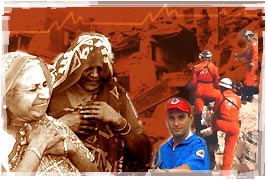|
|
|
|
|
| HOME | NEWS | INTERVIEW | |||
|
February 2, 2001
NEWSLINKS
|
The Rediff Interview/Disaster Preparedness expert Alan Bradbury
'I fear areas that are totally devastated will Alan Bradbury, regional disaster preparedness delegate of the International Federation of Red Cross and Red Crescent Societies, has worked in the disaster-affected regions of Cambodia, Fiji and Alamati. One of the first to reach Kutch in the aftermath of the earthquake, the New Zealander spoke to Basharat Peer about the steps to minimise casualties in natural disasters and the relief work in Kutch.
Being a disaster preparedness expert, what do you believe needs to
be done in order to minimise casualties and injury to human life in
case of a natural disaster?
There is an urgent need for 'disaster preparedness' in a disaster
prone country like India. Firstly, it is very important to be prepared to respond to the
disaster. To know how to act in such a situation, how to effectively
organise relief operations, how to assess the extent of damage.
The measures to be recommended are going to be different from community
to community. For instance, what a resident in a high rise building can
be suggested to do at the time of an earthquake, would be different from
a person under the threat of a cyclone in a coastal area.
In order to make that possible it is imperative to ensure enough number
of trained people who have the skills and knowledge required in
'disaster preparedness.' We are planning this at the Red Cross. It is equally
true for other governmental and non governmental organisations.
Why are there more deaths in developing countries in
comparison to developed countries in disasters of a similar nature?
There are two main reasons. First, the designs and the structural
quality of buildings in developed countries can resist earthquakes or any other natural disaster.
However, in developing countries people compromise on such standards owing to the expenses involved. They choose what they can afford over absolute safety.
The denser population in underdeveloped countries is another reason for a greater number of casualties.
Do you believe the difference in quality and efficiency of
relief services in the developing and developed countries also makes a
difference to the number of people affected?
You were one of the few experts to first reach Gujarat, how long do
you think it would take for the state to return to normalcy?
I cannot make a definite prediction. There are parts of Ahmedabad
that are functioning reasonably today but people's lives are not
operating normally. For the lesser affected areas, it might take several
months to return to normalcy whereas for certain adversely affected
areas it might take an year. I fear some areas that are totally devastated would
never return to normalcy.
There have been reports that lack of coordination amongst various
agencies has affected relief work in Gujarat.
See, the coordination of relief activities immediately after a disaster
is a very difficult task anywhere. It takes a day or two to smoothen out
things, especially when relief is pouring in from all corners of the
world. We had certain difficulties initially but now things are better. More importantly, it did not stop us from carrying on our work.
Design: Lynette Menezes
The Complete Coverage | List of earthquake sites
|
||
|
HOME |
NEWS |
CRICKET |
MONEY |
SPORTS |
MOVIES |
CHAT |
BROADBAND |
TRAVEL ASTROLOGY | NEWSLINKS | BOOK SHOP | MUSIC SHOP | GIFT SHOP | HOTEL BOOKINGS AIR/RAIL | WEDDING | ROMANCE | WEATHER | WOMEN | E-CARDS | SEARCH HOMEPAGES | FREE MESSENGER | FREE EMAIL | CONTESTS | FEEDBACK |
|||